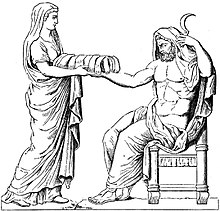
Back Rea Afrikaans ሬያ Amharic ريا Arabic ريا ARZ ৰীয়া Assamese Rea AST Reya Azerbaijani Рея (мифология) Bashkir Рэя Byelorussian Рэя (міталёгія) BE-X-OLD
| Rhea | |
|---|---|
Mother goddess | |
| Member of the Titans | |
 Rhea presenting Cronus with the stone wrapped in swaddling bands | |
| Ancient Greek | Ῥέα |
| Animals | Lion |
| Symbol | Chariot, tambourine, crown, cornucopia |
| Tree | Silver fir |
| Personal information | |
| Parents | |
| Siblings |
|
| Consort | Cronus, Zeus (Orphic) |
| Offspring | Poseidon, Hades, Demeter, Hestia, Hera, Zeus, Persephone (Orphic) |
| Equivalents | |
| Roman equivalent | Ops |
| Canaanite equivalent | Asherah[1] |
Rhea or Rheia (/ˈriːə/;[2] Ancient Greek: Ῥέα [r̥é.aː] or Ῥεία [r̥ěː.aː]) is a mother goddess in ancient Greek religion and mythology, the Titan daughter of the earth goddess Gaia and the sky god Uranus, himself a son of Gaia. She is the older sister of Cronus, who was also her consort, and the mother of the five eldest Olympian gods (Hestia, Demeter, Hera, Poseidon, and Zeus) and Hades, king of the underworld.
When Cronus learnt that he was destined to be overthrown by one of his children like his father before him, he swallowed all the children Rhea bore as soon as they were born. When Rhea had her sixth and final child, Zeus, she spirited him away and hid him in Crete, giving Cronus a rock to swallow instead, thus saving her youngest son who would go on to challenge his father's rule and rescue the rest of his siblings. Following Zeus's defeat of Cronus and the rise of the Olympian gods into power, Rhea withdraws from her role as the queen of the gods to become a supporting figure on Mount Olympus. She has some roles in the new Olympian era. She attended the birth of her grandson Apollo and raised her other grandson Dionysus. After Persephone was abducted by Hades, Rhea was sent to Demeter by Zeus. In the myth of Pelops, she resurrects the unfortunate youth after he has been slain.
In early traditions, she is known as "the mother of gods" and therefore is strongly associated with Gaia and Cybele, who have similar functions. The classical Greeks saw her as the mother of the Olympian gods and goddesses. The Romans identified her with Magna Mater (their form of Cybele), and the Goddess Ops.
- ^ Miller, Patrick D. (1967). "El the Warrior". The Harvard Theological Review. 60 (4): 411–431. doi:10.1017/S0017816000003886. JSTOR 1509250. S2CID 162038758.
- ^ "Rhea". Random House Webster's Unabridged Dictionary.
© MMXXIII Rich X Search. We shall prevail. All rights reserved. Rich X Search